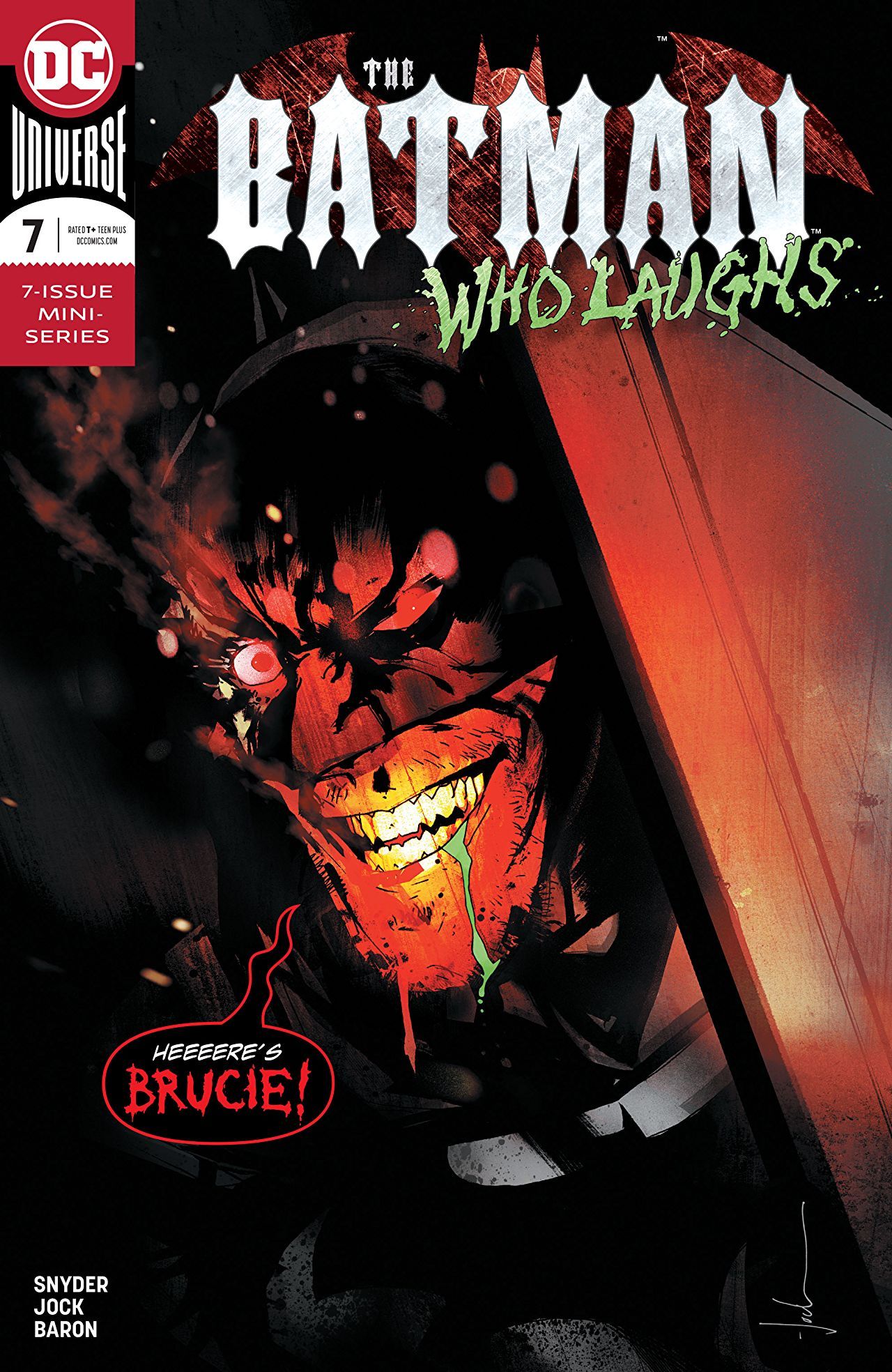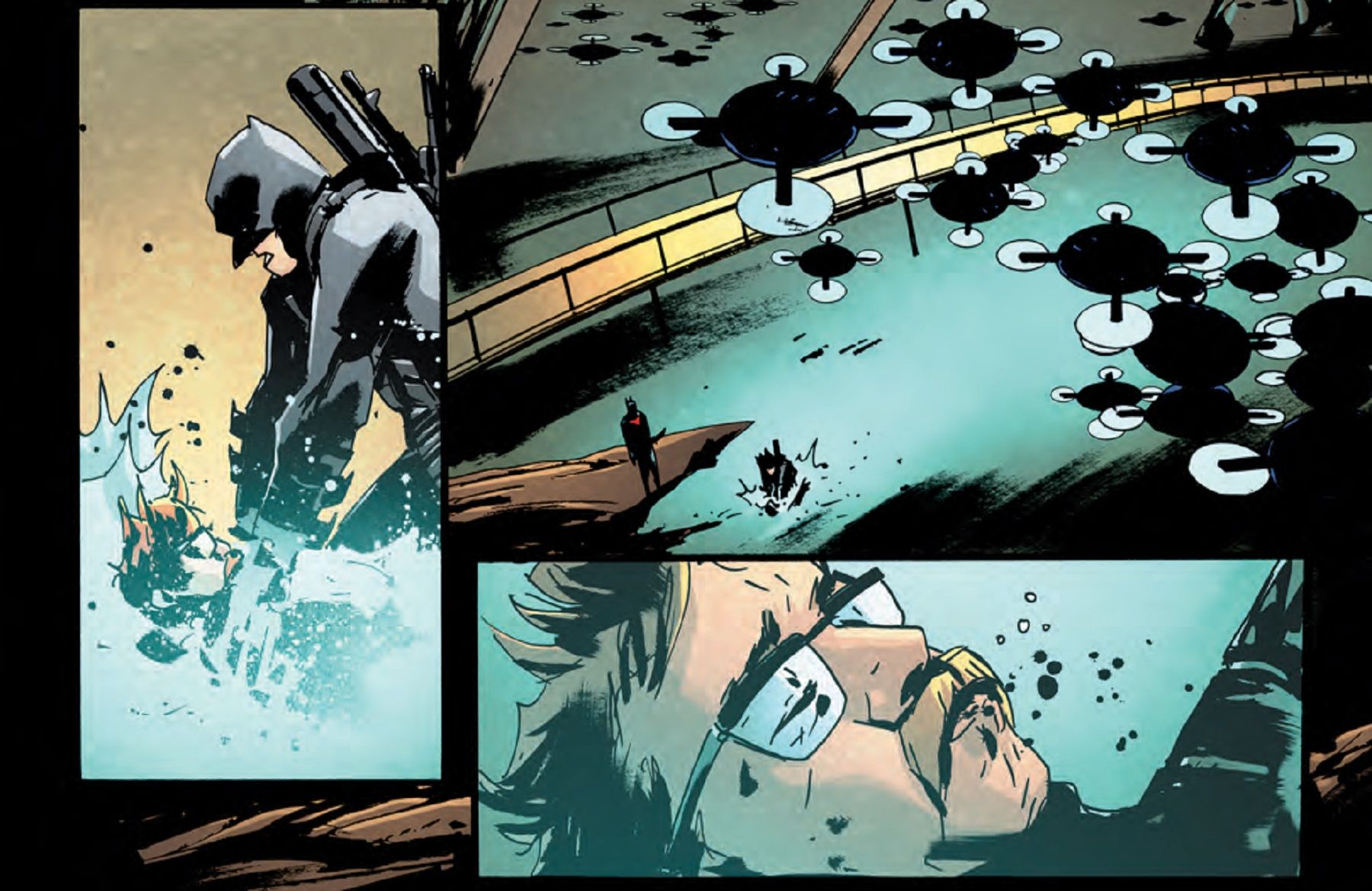The Batman Who Laughs #7
- WRITER
- Scott Snyder
- Artist
- Jock
- Letterer
- Sal Cipriano
- Cover Artist
- Jock
- Publisher
- DC Comics
- Price
- 4.99
- Release Date
- 2019-07-31
- Colorist
- David Baron
The Batman Who Laughs could barely contain itself. The ancillary Batman: The Grim Knight one-shot was added to give the spotlight to another evil Batman, and then a seventh issue was added to Scott Snyder and Jock's main series. Now, though, The Batman Who Laughs #7 finally brings the mini-series to an end, and the tense, psychological Batman vs. Batman drama needs every page it can get to contain Snyder and Jock's intense conclusion.
While the concept of a good Batman fighting against an evil one is simple enough, Snyder's compelling and multi-faceted execution of it adds layers of emotional complexity. The story, and its conclusion, are bolstered by the addition of the Jim Gordon vs. Grim Knight dynamic. That dynamic itself is furthered by the return of Gordon's son, James, and how the troubled youth is torn between his father, and a villain who only plays into his psychopathic urges.
Starting from there, Snyder pulls off a genuine sense of uncertainty regarding James' direction. James is seemingly on the path to reformation, but the temptation back to his dark nature is all too palpable. Does James side with his father, or with The Grim Knight? He makes his decision prior to the series' conclusion, and the result is fitting, and satisfying.
That decision plays a large part in the outcome of Gordon's battle with The Grim Knight – one that Gordon doesn't necessarily emerge from intact. Gordon's showdown with a version of Batman who's arguably more dangerous than the one he knows, is suspenseful and every bit as engaging as Batman's own with his evil counterpart. And if anyone doubts that Gordon has the prowess to go up against any version of Batman, Snyder's story makes it more than believable.
The main event, though, is Batman and The Batman Who Laughs, and it's staged by Jock and Snyder to feature panels filled with darkness that the light is trying to overcome. Batman's holding onto his sanity by the thinnest of emotional threads – and that's the basis of what's carried the two foes' battle throughout the series, right up through its conclusion. No matter how far Batman seems to have fallen, he continues to fight, even past the seeming point of no return. No matter how dark he might seem, Batman is always the hero, and Snyder's script epitomizes why.
Few artists could capture a story so steeped in darkness as well as Jock. His take on The Batman Who Laughs is no less dark and sinister than Greg Capullo's or any other artist who has rendered the character. Jock's jagged lines and sharp contrasts evoke a sense of twisted distortion that perfectly fits a character who himself is a twisted distorted version of The Dark Knight. The atmosphere of the story would not have been well-served with crisp, clean and bright imagery – Jock ensures that the darkness is pervasive and all-encompassing.
Colorist David Baron knows exactly how to embellish Jock's art, as well. There's plenty of red -- as well there should be -- to capture multiple aspects of Snyder and Jock's story. Batman's eerie transformative eyes, The Batman Who Laughs' Joker-like smile and the overall hellish emotional landscape of the story are well-suited to Baron's talents. Letterer Sal Cipriano plays no small part, either -- his alternating fonts convey the degree of Batman's descent into darkness. Cipriano's letters have effectively communicated Bruce's state of mind throughout the series in a way that neither art nor words could on their own.
The psychology of Batman has long been that no matter how far Bruce might spiral into the dark, he will always find his way back to the light. The Batman Who Laughs has effectively put that motif in physical form, forcing Bruce to confront his own darkness -- not with just his mind, but also with his fighting skills. And the series' conclusion hammers home what Snyder and many others have said about The Dark Knight: Batman always wins.
Even if the one he has to defeat is himself.


